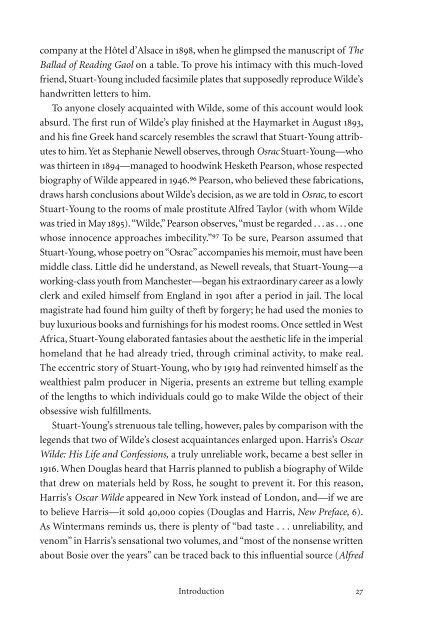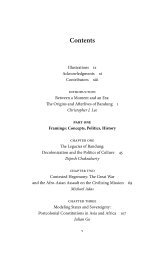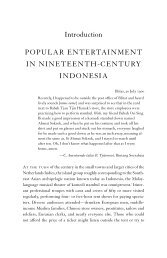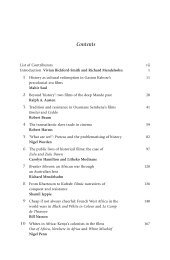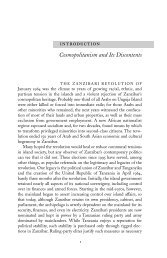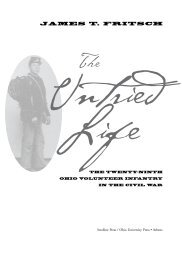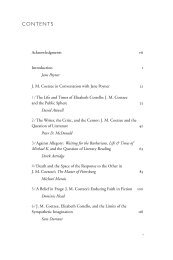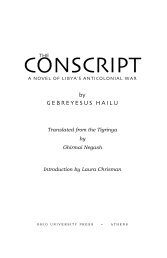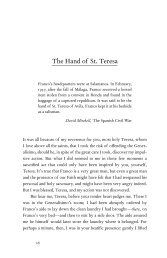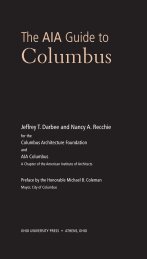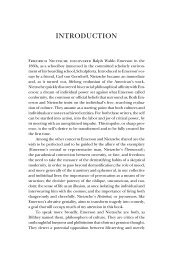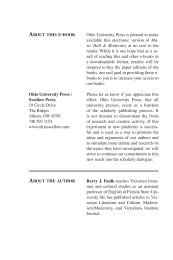Oscar Wilde and Modern Culture - Ohio University Press & Swallow ...
Oscar Wilde and Modern Culture - Ohio University Press & Swallow ...
Oscar Wilde and Modern Culture - Ohio University Press & Swallow ...
Create successful ePaper yourself
Turn your PDF publications into a flip-book with our unique Google optimized e-Paper software.
company at the Hôtel d’Alsace in 1898, when he glimpsed the manuscript of The<br />
Ballad of Reading Gaol on a table. To prove his intimacy with this much-loved<br />
friend, Stuart-Young included facsimile plates that supposedly reproduce <strong>Wilde</strong>’s<br />
h<strong>and</strong>written letters to him.<br />
To anyone closely acquainted with <strong>Wilde</strong>, some of this account would look<br />
absurd. The first run of <strong>Wilde</strong>’s play finished at the Haymarket in August 1893,<br />
<strong>and</strong> his fine Greek h<strong>and</strong> scarcely resembles the scrawl that Stuart-Young attributes<br />
to him. Yet as Stephanie Newell observes, through Osrac Stuart-Young—who<br />
was thirteen in 1894—managed to hoodwink Hesketh Pearson, whose respected<br />
biography of <strong>Wilde</strong> appeared in 1946.⁹₆ Pearson, who believed these fabrications,<br />
draws harsh conclusions about <strong>Wilde</strong>’s decision, as we are told in Osrac, to escort<br />
Stuart-Young to the rooms of male prostitute Alfred Taylor (with whom <strong>Wilde</strong><br />
was tried in May 1895). “<strong>Wilde</strong>,” Pearson observes, “must be regarded . . . as . . . one<br />
whose innocence approaches imbecility.”⁹⁷ To be sure, Pearson assumed that<br />
Stuart-Young, whose poetry on “Osrac” accompanies his memoir, must have been<br />
middle class. Little did he underst<strong>and</strong>, as Newell reveals, that Stuart-Young—a<br />
working-class youth from Manchester—began his extraordinary career as a lowly<br />
clerk <strong>and</strong> exiled himself from Engl<strong>and</strong> in 1901 after a period in jail. The local<br />
magistrate had found him guilty of theft by forgery; he had used the monies to<br />
buy luxurious books <strong>and</strong> furnishings for his modest rooms. Once settled in West<br />
Africa, Stuart-Young elaborated fantasies about the aesthetic life in the imperial<br />
homel<strong>and</strong> that he had already tried, through criminal activity, to make real.<br />
The eccentric story of Stuart-Young, who by 1919 had reinvented himself as the<br />
wealthiest palm producer in Nigeria, presents an extreme but telling example<br />
of the lengths to which individuals could go to make <strong>Wilde</strong> the object of their<br />
obsessive wish fulfillments.<br />
Stuart-Young’s strenuous tale telling, however, pales by comparison with the<br />
legends that two of <strong>Wilde</strong>’s closest acquaintances enlarged upon. Harris’s <strong>Oscar</strong><br />
<strong>Wilde</strong>: His Life <strong>and</strong> Confessions, a truly unreliable work, became a best seller in<br />
1916. When Douglas heard that Harris planned to publish a biography of <strong>Wilde</strong><br />
that drew on materials held by Ross, he sought to prevent it. For this reason,<br />
Harris’s <strong>Oscar</strong> <strong>Wilde</strong> appeared in New York instead of London, <strong>and</strong>—if we are<br />
to believe Harris—it sold 40,000 copies (Douglas <strong>and</strong> Harris, New Preface, 6).<br />
As Wintermans reminds us, there is plenty of “bad taste . . . unreliability, <strong>and</strong><br />
venom” in Harris’s sensational two volumes, <strong>and</strong> “most of the nonsense written<br />
about Bosie over the years” can be traced back to this influential source (Alfred<br />
Introduction 27


